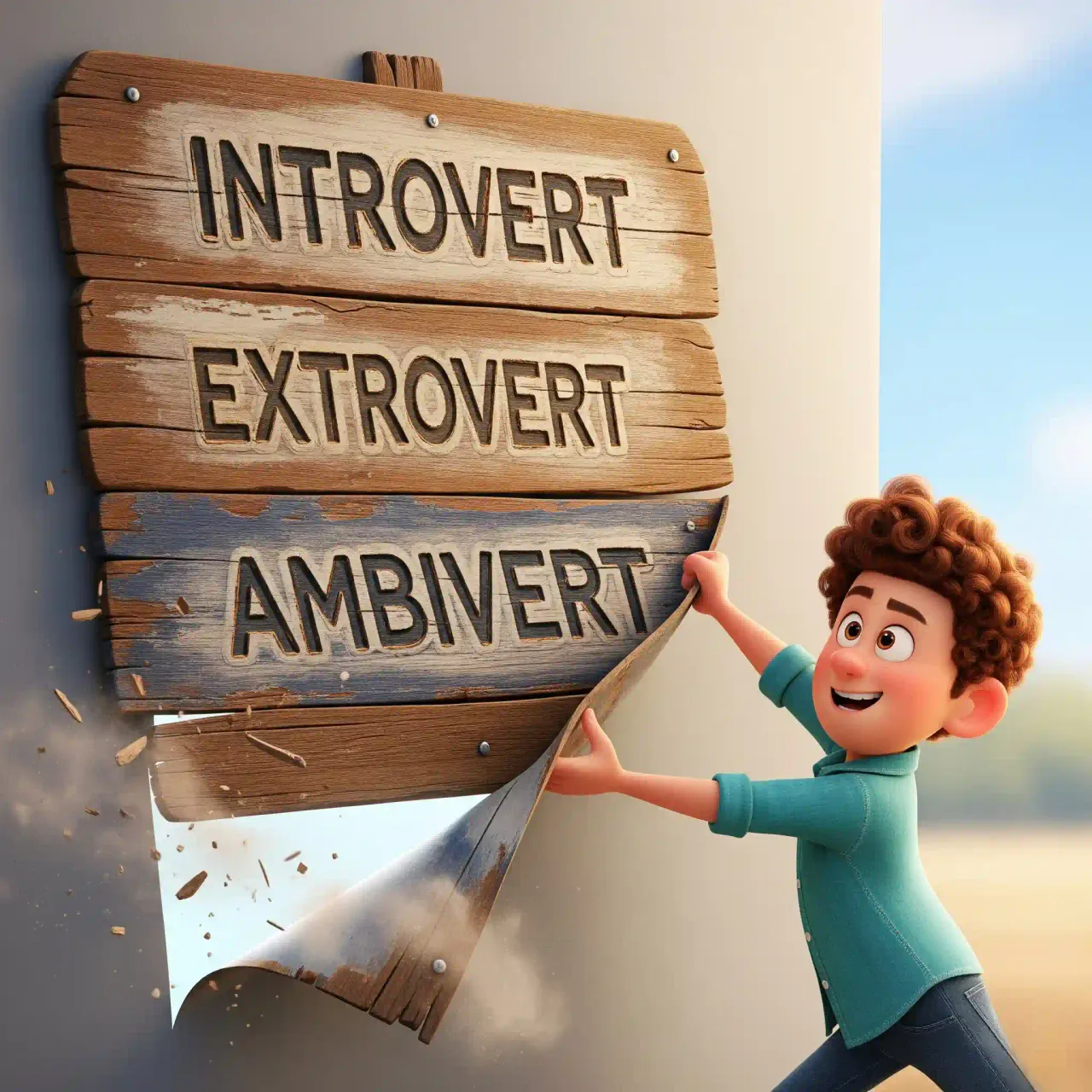Introvert, Extrovert, Ambivert — Labels that may be limiting your mental growth
Here's the catch, all labels feel like a shortcut to knowing yourself, but sometimes they're the quickest path to self-imposed limitation.

Table of Contents
Introvert, Extrovert, Ambivert — Labels that may be limiting your mental growth
The identity trap
We exist in a society that’s obsessed with labeling individuals and putting them in neat little boxes. “Introvert.” “Extrovert.” “Ambivert.” There’s even a meme or quiz for it all. But what if it’s the labels we hold so dear that are actually keeping us stuck instead of propelling us forward? Here’s the catch: all labels feel like a shortcut to knowing yourself, but sometimes they’re the quickest path to self-imposed limitation.
The rise of personality labels
Let’s take a step back. The entire introvert-extrovert phenomenon isn’t exactly new—Carl Jung introduced those words to us way back in the early 1900s, and since then, individuals have been swarming to personality types like moths around a porch light. It is no wonder that we adore this stuff. Labels are reassuring. They provide us with a sense of self, allow us to feel legitimized, and allow us to connect with others who utilize the same code. There is security in proclaiming, “I’m an extrovert, that’s why I love parties!” or “Sorry, just an introvert thing.” But—gratifying as that is, there is another aspect. The issue begins when those labels become prison cells. When you say to yourself, “I’m just not the type to take risks,” or “People like me don’t do ……..,”, you’re not getting to know yourself—you’re constructing brick walls around your potential. Quick insight: Labels can comfort — but they can also confine.
Adlerian Psychology: Beyond the label
Let’s go back in time with Alfred Adler, one of the game-changers in psychology. Adler never considered human beings to be introverts or extroverts in pure terms. His worry? Uniqueness of human beings. In his opinion, who you are isn’t so much of a fixed kind of personality type, but the way you live, the pulls of objectives, and the social condition that you’re reacting to. Personality, in Adler’s view, is not an inking; it’s a reflection, and it’s always changing. Those tidy Introvert-Extrovert-Ambivert boxes? They don’t account for how human beings have the capacity to surprise themselves when driven by purpose. If you’re accustomed to sitting in the “introvert” chair, you may believe you’ll never feel at ease leading a group or asserting yourself. But Adler would say to you: “It’s not what you’re labeled as that counts, but where you’re headed.”. What are you trying to contribute? What’s your meaning? Real growth happens when you get curious about these questions—not stuck on your supposed type.
How labels can limit mental growth
This is where the trap reveals itself. Imagine you’ve sported the “introvert” badge on your sleeve. Your inner narrative is: “I can’t lead, I can’t really connect with people, that’s just the way I am.” Instead, ask yourself, “What is the purpose behind how i show up? Is this pattern in service of my dreams, or just keeping me safe from imagined fears?” Or perhaps “I’m an extrovert” is your shield. “I always need people to feel okay, it’s just who I am.” But wouldn’t it be great to have inner strength—to be okay when you’re by yourself and it’s just you and your thoughts? And then there’s this word ambivert—split in the middle.
It’s so easy to just sit there and never test your edges. But the real present is practicing intentional flexibility: leaning into new roles, exploring in new rooms, seeing yourself as an ongoing unfinished business (in the best possible meaning of the term). Any time you catch yourself rehearsing a label, stop and ask yourself: Are your habits truly helping you move toward what matters, or are you circling the same old fears under the banner of “personality”?
Reframing identity through Adlerian Growth
Now it’s getting good. What if instead of asking, “Am I an introvert or extrovert?” you asked, “Why am I appearing this way socially? Is this behaviour serving my goals, or just getting me out of being hurt by faulty fears?” Adler instructed that courage is needed—not to change who you are, but to develop who you are. So what does that mean? Perhaps you’re just experimenting with a new work function, attending an event you would otherwise avoid, or setting yourself into a position of discomfort just to find out which muscles develop out of the stretch. Self-reflection is your ally here. Are your habits truly propelling you towards what matters, or are you merely dancing around the same old fears in the guise of “personality”?
You’re not a type — You’re a whole person
If anything can be located in the Adlerian map, it’s this: you are not locked into your type, your test score, or your total of your tags. You are a dynamic, evolving human, able to grow in ways you can’t yet envision. Self-determination—deciding, changing AND expanding—is your birthright. So let’s conclude with a brief exercise: If you weren’t trying to fit into a tag, who would you be?
Ready to trade in your box for possibility? Step into our “Dear Diary” journal and begin to see yourself as so much more than a definition. The next chapter? Yours to write.
Related Posts


Anxiety in disguise: The feelings you didn't know were signals
We've been sold this Hollywood version of anxiety where people hyperventilate into paper bags and have dramatic meltdowns. But real anxiety? It's way more sneaky than that.

Burnout in a broken economy: Why career dreams are collapsing
Sometimes, the weight of carrying a dream slowly becomes the burden that breaks us.
